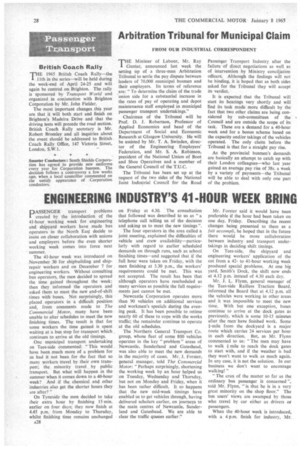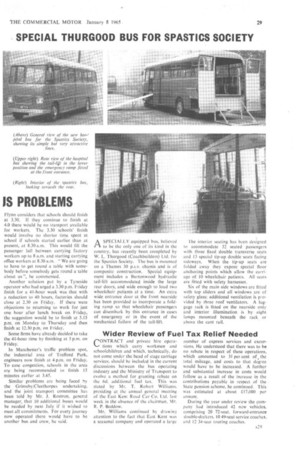ENGINEERING INDUSTRY'S 41-HOUR WEEK BRING JS PROBLEMS
Page 30

Page 31

If you've noticed an error in this article please click here to report it so we can fix it.
PASSENGER transport problems created by the introduction of the 41-hour working week for engineering and shipyard workers have made bus operators in the North East decide to insist on closer collaboration with unions and employers before the even shorter working week comes into force next summer.
The 41-hour week was introduced on November 30 for shipbuilding and shiprepair workers and on December 7 for engineering workers, Without consulting bus operators, the men decided to spread the time gained throughout the week; then they informed the operators and asked them to meet the new end-of-shift times with buses. Not surprisingly, this placed operators in a difficult position and, from comments made to The Commercial Motor, many have been unable to alter schedules to meet the new finishing times. The result is that for some workers the time gained is spent waiting at a bus stop for transport which , eontinues to arrive at the old timings.
One municipal transport undertaking on Tees-side commented: "This would have been much more of a problem for us had it not been for the fact that so many workers travel by their own transport; the minority travel by public transport. But what will happen in the summer when it comes down to a 40-hour week? And if the chemical and other industries also get the shorter hours they are after? "
On Tyneside the men decided to take their extra hour by finishing 15 min. earlier on four days; they now finish at 4.45 p.m. from Monday to Thursday, whilst finishing time remains unchanged
A28 on Friday at 4.30. The consultation that followed was described to us as "a telephone call telling us of the decision and asking us to meet the new timings ".
The four operators in the area called a joint meeting, explained the difficulties of vehicle and crew availability—particularly with regard to earlier scheduled demands on through runs, such as school finishing times—and suggested that if the full hour were taken on Friday, with the men finishing at 3.30 p.m., the workers' requirements could be met. This was not accepted. The result has been that although operators have rescheduled as many services as possible the full requirements just cannot he met.
Newcastle Corporation operates more than 90 vehicles on additional services and workmen's specials during the evening peak. It has been possible to retime nearly 60 of these to cope with the works traffic; the remainder continue to operate at the old schedules.
The Northern General Transport Co. group, whose fleet of some 800 vehicles operates in the key "problem" areas of Newcastle, Sunderland and Gateshead, was also able to meet the new demands in the majority of cases. Mr. J. Forster, general manager, told The Commercial Motor: "Perhaps surprisingly, shortening the working week by an hour helped us on Tuesday, Wednesday and Thursday, but not on Monday and Friday, when it has been rather difficult. It so happens that the new mid-week timings have enabled us to get vehicles through, having delivered scholars earlier, on journeys to the main centres of Newcastle, Sunderland and Gateshead. We are able to clear the traffic queues earlier." Mr. Forster said it would have been preferable if the hour had been taken on one day. Friday. Describing the recent changes being presented to them as a fait accompli, he hoped that in the future there would be more collaboration between industry and transport undertakings in deciding shift timings.
On Tees-side, the shipyard and engineering workers' application of the cut from a 42to 41-hour working week produced special problems. At one big yard, Smith's Dock, the shift now ends at 4.12 p.m. instead of 4.30 each day.
Mr. J. L. Flynn, general manager of the Tees-side Railless Traction Board, informed the Board that at 4.12 p.m. all the vehicles were working in other areas and it was impossible to meet the new time. With but one exception, buses continue to arrive at the dock gates as previously, which is some 10-15 minutes after the men have finished work. Some *-mile from the dockyard is a major route which carries 24 services per hour in each direction. But, as Mr. Flynn commented to us: "The men may have to walk I mile to reach the dock gates to start with, and if the weather is bad they won't want to walk as much again.. In any case, it is not the solution. In our business we don't want to encourage walking!
"The crux of the matter so far as the ordinary bus passenger is concerned ", said Mr. Flynn, "is that he is in a very great minority on the shop floor." The bus users' views are swamped by those who travel by car either as drivers or passengers.
When the 40-hour week is introduced, with a 4 p.m. finish for industry, Mr. Flynn considers that sChools should finish at 3.30. If they continue to finish at 4.0 there wOuld be no transport available for workers, The 3.30 schools' finish would involve no shorter time spent at school if schools started earlier than at present, at 8.30 a.m. This would fill the passenger lull between carrying factory workers up to 8 a.m, and starting carrying office workers at 8.30 a.m. We are going to have to get round a table with somebody before somebody gets round a table about us ", he commented.
Another solution put by a Tyneside operator who had urged a 3.30 p.m. Friday finish for a 41-hour week was that with a reduction to 40 hours, factories should close at 2.30 on Friday. If there were objections to returning to work for just one hour after lunch break on Friday, the suggestion would be to finish at 5.15 p.m. on Monday to Thursday and then finish at 12.30 p.m. on Friday.
Some firrns have already decided to take the 41-hour time by finishing at 3 p.m. on Friday.
In Manchester's traffic problem spot, the industrial area of Trafford Park, engineers now finish at 4 p.m. on Friday. To ease congestion, schools in the area are being recommended to finish 15 minutes earlier at 3.45.
Similar problems are being faced by the Grimsby/Cleethorpes undertaking, and the joint transport committee has been told by Mr. J. Rostron, general manager, that 10 additional buses would he needed by next July if it wished to meet all commitments. For every journey now operated there would have to he another bus and crew, he said.
PIA SPECIALLY equipped bus, believed to be the only one of. its kind in the country, has recently been completed by W. L. Thurgood (Coacftbuilders) Ltd. for the Spastics Society. The bus is mounted on a Thames 30 p.s.v. chassis and is of composite construction. Special equipment includes a Burtonwood hydraulic tail-lift accommodated inside the large rear doors, and wide enough to load two wheelchair patients at a time. An extra wide entrance door at the front nearside has been provided to incorporate a folding ramp so that wheelchair passengers can disembark by this entrance in eases of emergency or in the event of the mechanical failure of the tail-lift.
'I he interior seating has been designed to accommodate 32 seated passengers with three fixed double transverse seats and 13 special tip-up double seats facing sideways, When the tip-up seats are folded away they expose special floor anchoring points which allow the carriage of 10 wheelchair patients. All seats are fitted with safety harnesses.
Six of the main side windows are fitted with top sliders and all windows are of safety glass; additional ventilation is provided by three roof ventilators. A luggage raCk is fitted on the nearside only and interior illumination is by eight lamps mounted beneath the rack or above the cant rail.




















































































































